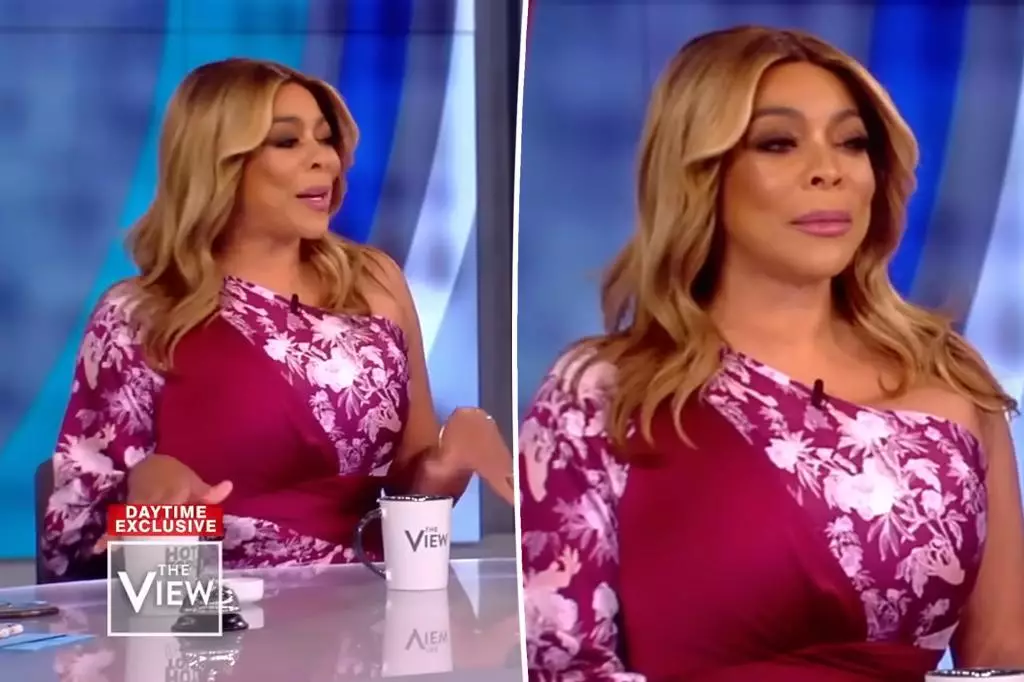Wendy Williams, the charismatic former talk show host, has been candid about her struggles under conservatorship, raising vital questions about autonomy and mental health. In a recently pre-taped interview with “The View,” Williams expressed frustration with her current situation, powerfully exclaiming, “get off my neck!” This poignant statement symbolizes not just her battle against her guardian but a larger fight for individual freedom and personal agency, which resonates with many who feel trapped by their circumstances.
Williams has gracefully navigated her tumultuous journey, and the latest revelations are both empowering and alarming. At 60, she shouldn’t be relegated to the margins of life, especially in a space likened to a “luxury prison.” With wisdom that comes from experience, she argues that she is unfairly labeled incapacitated, a term that deeply undermines her dignity and experiences. This brings to light the troubling nature of conservatorship and its potential abusiveness, especially when the concept can easily be misapplied, restricting someone’s liberties based on subjective judgments.
The Misunderstanding of Mental Health
In the interview, Williams revealed her recent hospital visit—not just a routine check but a proactive step towards regaining control over her health narrative. By opting for an independent psychiatric evaluation, she demonstrated an empowering move toward self-advocacy. Her declaration of having “passed with flying colors” counteracts the stigmas around mental health, allowing her to reclaim her narrative. Many individuals often hesitate to take similar steps due to fear of judgment or misunderstanding; Williams’ bravery may serve as an inspiration.
However, the broader conversation should dissect the societal perspectives surrounding mental health and the need for nuanced understanding. A diagnosis should never equate to a loss of individuality or the right to make personal decisions. Williams passionately asserts, “How dare they say I have incapacitation. I do not!” This ferocity is not just a defense of her personal truth; it’s an urgent call for society to reevaluate how we perceive mental health conditions and the requisite respect for those who endure them.
Confronting the Guardianship System
Celebrities like Williams remind us that the conservatorship system can often lead to exploitation rather than protection. Wendy’s grievances highlight a systemic flaw where individuals, particularly those in public life, may find their freedoms stripped away under the guise of guardianship. Her experiences also spark a national conversation about how the legal and psychological definitions of incapacitation can impede normal, everyday freedoms—from social gatherings to basic decision-making.
Furthermore, the stark contrast between Williams’ lively spirit and the constraints imposed upon her draws attention to an unsettling truth: those who care for individuals under such agreements may not always have their best interests at heart. Williams says, “These two people don’t look like me. They don’t talk like me. They don’t act like me,” drawing attention to the disconnect that can occur when guardianship is assigned without consideration of individual identity or personal values. This underscores an urgent need for a more empathetic and understanding approach to guardianship systems that often render the voices of those they seek to protect silenced.
Support and Solidarity in Times of Need
Williams highlighted the importance of support networks through her appearances on multiple talk shows, rekindling relationships with peers who have long admired her. The warmth expressed by her fellow media personalities, like Sunny Hostin, showcases the sense of community and encouragement that can uplift individuals facing such challenging circumstances. For those battling similar issues, the role of supportive friends and allies can be transformational.
By passionately sharing her story, Williams not only advocates for herself but for countless others who may not have the platform or voice to express their dissent against unwarranted oversight. Her continued presence in the media spotlight is a testament to her resilience and the potential of reclaiming one’s narrative in the face of adversity.
Ultimately, Wendy Williams stands as a powerful example of how individuals can assert their rights and cry out for liberation from the confines of misguided structures. In her voice, we can find a public demand for comprehensive reevaluation of conservatorship and the importance of safeguarding individual autonomy, reminding us all of the respect every human being deserves.

